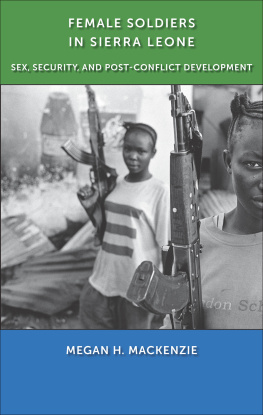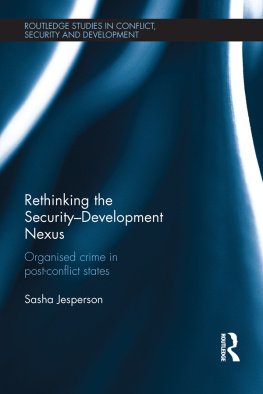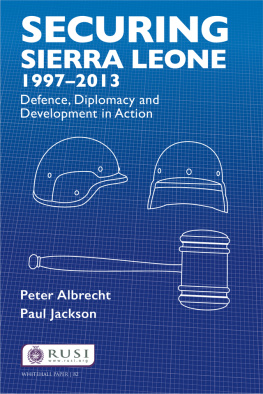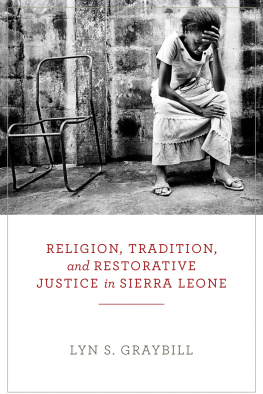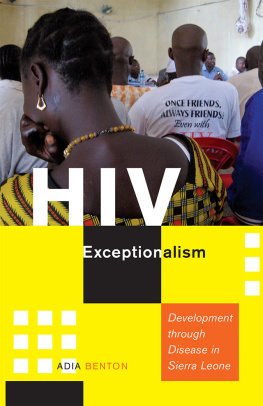Thank you for buying this ebook, published by NYU Press.
Sign up for our e-newsletters to receive information about forthcoming books, special discounts, and more!
Sign Up!
About NYU Press
A publisher of original scholarship since its founding in 1916, New York University Press Produces more than 100 new books each year, with a backlist of 3,000 titles in print. Working across the humanities and social sciences, NYU Press has award-winning lists in sociology, law, cultural and American studies, religion, American history, anthropology, politics, criminology, media and communication, literary studies, and psychology.
FEMALE SOLDIERS IN SIERRA LEONE
GENDER AND POLITICAL VIOLENCE SERIES
General Editor: Laura Sjoberg
Muscular Nationalism: Gender, War,
and Empire in India and Ireland, 19142004
Sikata Banerjee
Female Soldiers in Sierra Leone: Sex, Security,
and Post-Conflict Development
Megan H. MacKenzie
Female Soldiers in Sierra Leone
Sex, Security, and Post-Conflict Development
Megan H. MacKenzie
NEW YORK UNIVERSITY PRESS
New York and London
www.nyupress.org
2012 by New York University
All rights reserved
Library of Congress Cataloging-in-Publication Data
MacKenzie, Megan H. (Megan Hazel)
Female soldiers in Sierra Leone: sex, security, and post-conflict development / Megan H.
MacKenzie.
p. cm. (Gender and political violence series)
Includes bibliographical references and index.
ISBN 978-0-8147-6137-3 (cl: alk. paper)
ISBN 978-0-8147-7125-9 (ebook)
ISBN 978-0-8147-4497-0 (ebook)
1. Women soldiersSierra Leone. 2. Sex roleSierra Leone. 3. Postwar reconstructionSierra Leone. 4. Rape as a weapon of warSierra Leone. 5. Sierra LeoneHistoryCivil War, 1991-2002Participation, Female. 6. Sierra LeoneHistoryCivil War, 1991-2002Women. I. Title. II. Series: Gender and political violence series.
UB419.S5M33 2012
305.43355009664dc23
2012009364
References to Internet websites (URLs) were accurate at the time of writing. Neither the author nor New York University Press is responsible for URLs that may have expired or changed since the manuscript was prepared.
New York University Press books are printed on acid-free paper, and their binding materials are chosen for strength and durability. We strive to use environmentally responsible suppliers and materials to the greatest extent possible in publishing our books.
Manufactured in the United States of America
10 9 8 7 6 5 4 3 2 1
For my mom
CONTENTS
ACKNOWLEDGMENTS
The subject matter of much of this book has been emotionally challenging for meoverwhelming at times. If it were not for the encouragement, support, inspiration, and tough love of many people, I suspect this research would have been abandoned in its infancy.
This project was initiated because I developed a feminist curiosity sparked by excellent feminist scholars who were asking important questions. This book is possible because intellectuals like Christine Sylvester, Cynthia Enloe, Carol Cohn, Ann Tickner, Teresia Teaiwa and Lene Hansen carved out space for feminist research within the discipline. I have benefited greatly from the mentorship and encouragement of these scholars, as well as the community and support of the incredible next generation of feminists, including Swati Parashar, Annick Wibben, Cristina Masters, and Sungju Park-Kang (amongthankfully!many more). I especially wish to thank Christine Sylvester for her early encouragement and her continued insightful professional and intellectual advice, as well as Swati Parashar for sharing this journey with trust and understandingwe make a great team.
This book was also possible thanks to numerous people in Sierra Leone who showed me that almost everything I had previously learned about war and its aftermath was irrelevant. Most important were the women who took time from selling groundnuts, attending sewing class, taking care of their children, and the other many necessary tasks that filled their days to answer my questions and share their stories. My commitment to them to write about matters that have impacted their lives, are important to them, and have shaped their post-conflict futures drove this research project and shaped this book. A special thank-you also goes to Father Joseph Momoh, Edward Abu, Dehunge Shiaka, Father Joseph Turay, and Isha Kamara. I am grateful to Liz Oscroft for her endless generosity and wisdom, and for holding my hand through my own reintegration back to Canada after my field research.
When I was at the University of Alberta, Malinda Smith, Lois Harder, and Rob Aitkenencouraged me to stick with a research project that seemed beyond my capabilities and guided me with compassion and grace. I am also thankful for the institutional and intellectual support of both the Women and Public Policy Program and the Belfer Center for Science and International Affairs at Harvard.
I am very grateful for Laura Sjobergs enthusiasm for this project and for guiding me through the final phases of the book. Thank you also to Morgan Hanks, Marianne Bevan, Dehunge Shiaka, and Mohamed Sesay (and all others), who read early drafts and gave excellent feedback. Gratitude is extended to Robbie Shilliam and Pat Moloney for their advice and friendship. Special thanks to Teresia Teaiwa for her mentorship and for joining me for hours of writing and cookies at Clarks Caf in Wellington.
Thank you to my friends and to my family for accepting me and my often depressing topics of conversation. Two of the strongest women I know, my mom and my sister, have been constant sources of support, practical words, and love. Finally, I cannot find words enough to thank my partner in life, Jason, for making me believe that intelligence is beautiful and for inspiring me with his own brilliance and creativity. Together, this life is a joyful adventure.
FOREWORD
The New Feminist International Relations
CHRISTINE SYLVESTER
At last, students of feminist international relations (IR) have become interested in the women hiding in plain view: the women of war and conflict, which is to say the women who become agents of collective violence and, when possible, of post-conflict strategies. The violent woman of international relations is not only more OK to study than she once was; she is apt to be visited in situ by academics from a field that used to associate fieldwork with comparative politics, anthropology, and area studies. True IR scholars once seemed to theorize from their university offices and to produce high abstractions as a result. Everyday people were either invisible in international relations, because they were beside the point, or slotted into a few categories of relevancesoldiers, civilians, deaths. Now, along with exposing the many locations once blotted out by a Great Powers focus, analysts of feminist international relations are increasingly going to ground and endeavoring to study up rather than do IR theory at the top. Many are talking to people who have experienced war and conflict and also know personally and politically about post-conflict programs pursued by local and international communities.
Megan MacKenzie is a headliner in this new approach to studying and doing IR. Her book dashes prominent assumptions that war is about states, weapons, and strategies or is, at base, a set of activities that men plan and execute and women mostly suffer and protest. Unless we know womens experiences with one of the most persistent social institutions known to humanswarall the studies in the world will not be able to overcome fundamental shortcomings around what war is, who and what it involves, and what its consequences are for people and societies. Pressing questions need to be addressed, as they are here, concerning gender-based violence in war and postwar, what normal security for women means in different places (e.g., is it conjugal security?), and how the interested researcher can talk to women combatants, hear them, and interpret experiences that are bound to be very distant from her personal and political frames of reference. MacKenzie addresses these and other key issues in the context of a war that took her to Sierra Leone.

